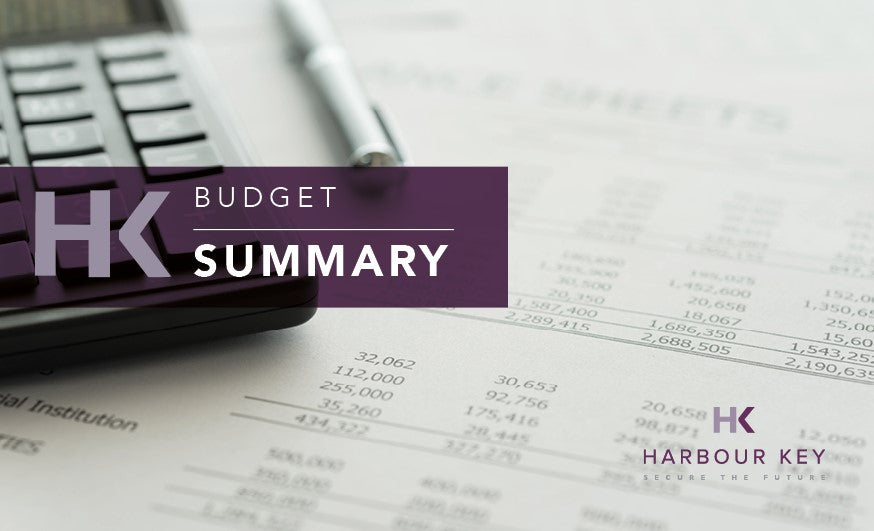
BUDGET HIGHLIGHTS
COVID-19 Business Support Measures

- The furlough scheme will continue until 30 September 2021 under its current rules, with employers having to make a 10% contribution to the employee cost from 1 July 2021 and 20% from 1 August 2021, as the scheme unwinds.
- The Self Employed Income Support Scheme (SEIS) – the fourth grant remains in place for the period February to April, with a new fifth grant from May. The major change is that new self-employed individuals will be eligible for the fourth and fifth grants provided they had filed their 2020 self-assessment return before midnight on 2 March (previously eligibility was based on the filing of a 2019 self-assessment return).The rules for the fourth grant are the same as previous grants, however for the fifth grant, only those self-employed individuals where their turnover has fallen by 30% or more will be entitled to the full grant. Those where the fall is less than 30% will be entitled to a reduced amount.
- Restart Grants for businesses in England – Non-essential retail businesses which are due to re-open on 12 April, will be entitled to claim a £6,000 grant per premises. Up to £18,000 grants will be available for hospitality, leisure, gyms and personal care businesses.
- A new Recovery Loan Scheme to replace the bounce back loans and CBILS loans schemes, due to end on 31 March, is to be introduced. Loans are available from £25k to £10m to help businesses restart and cope with the next stage of the recovery. The Government will guarantee 80% of the loan.
- Business Rates holidays will continue until the end of June.
- There will be an extension of the apprentice hiring scheme to 30 September in England with a cash support of £3k.
- Single contactless payments increase from £45 to £100, and cumulative contactless payments up to £300.
- Help to Grow Grants for management and digital training for business, covering up to 90% of the costs. Support will start in September, but businesses can register now HERE.
Corporation Tax

Increase in corporation tax rates
From 1 April 2023 the main rate of corporation tax will increase from 19% to 25% for taxable profits above £250,000. A small company profits rate of 19% will apply to profits less than £50,000. For profits between £50,000 and £250,000 the main rate (25%) will be payable, but reduced by marginal relief which gradually increases the effective corporation tax rate.
This change is going back to what was in place pre-2015, after which one rate of corporation tax was introduced as the planned approach and phased in over the last few years. The change back to more than one corporation tax rate also means the re-introduction of the “associated companies” rules to prevent business owners trying to keep profits below the £250k threshold by having separate companies. This basically means, if you have three connected companies with common control, either part of a group or controlled by the same persons, the £250k threshold for the 25% tax rate to apply, becomes £83,333 for each company.
The change to corporation tax rates does mean for owner-managed businesses where the owners take money out via dividends rather than salary/bonus that the tax cost of running a company and extracting profit is increased, where the profits exceed £50k.
In addition, close investment companies will pay the 25% rate of corporation tax, whatever the level of profit. A close investment company is basically a company owned by less than five unconnected persons and which undertakes only investment activities other than property letting, so some family investment companies will be caught.. We had predicted that one day, The Treasury would remember the fact that close investment companies had always paid the highest rate of corporation tax.
The change will also impact non-resident landlord companies who until recently paid income tax, not corporation tax. On the change to the corporation tax regime they had a 1% saving, however above £50,000 of profits, they will now pay at a higher rate than they would have under the income tax regime.
130% Capital Allowance (“the super deduction”)
Companies will be able to claim a 130% deduction on the purchase of most new plant & machinery investments that normally qualify for the 18% writing down allowance, if the expenditure is incurred after 1 April 2021 and before 31 March 2023. The allowance will enable a tax deduction exceeding the cost of the asset, however any receipt from the disposal of an asset under which a ‘super deduction’ was claimed will also be enhanced to 130% of the proceeds received.
An allowance of 50% will be available on certain plant & machinery that normally qualifies for the 6% rate.
Corporate losses
A temporary extension to carry back of corporate loss rules will apply for year-ends ending between 1 April 2020 and 31 March 2022, losses can be carried back three years, as opposed to one, enabling businesses to use losses accumulated during the COVID-19 downturn to be offset against trading profits earned in the earlier two years to obtain tax repayments. The loss carry back will be capped at £2m for each loss-making year and carried back three years against the same trade.
Slight changes are also being made to the corporate loss regime for carried forward losses following the change in the rules in April 2017. Some issues/problems have been identified following the change and for accounting periods beginning after 1 April 2021 new measures will be introduced for group relief for carried forward losses and an extension to the change of ownership rules (where the use of losses can be restricted).
Diverted profits tax rates
A tax that applies to large multinational businesses who enter in to contrived arrangements to divert profits from the UK tax system to other low tax jurisdictions, will increase in line with the increase in UK corporation tax rates moving from 25% to 31%.
Research & Development – R&D is to be reviewed to see if it is fit for purposes with regards to attracting business and investment to the UK. In addition, immigration rules will be reviewed with regards to highly skilled individuals and entrepreneurs obtaining visas. Measures will also be introduced regarding company listings, FCA regulation and other measures to make the UK more attractive to attracting and listing companies, following The Kalifa report, chaired by former Worldpay Group chief executive Ron Kalifa, commissioned to look at making the UK the place to be for Fintech.
Individual Taxes

- Personal Allowance (the amount you can earn tax free), increases from 5th April to £12,570, and will then be frozen until April 2026;
- The threshold at which you pay higher rate income tax is increased to £50,270, from 5th April and then again frozen until April 2026;
- No increases to any of the income tax rates;
- The lifetime allowance for pension savings (£1,073,100), is to be frozen until April 2026;
- For the self-employed/members of partnerships/LLPs, similar extensions to the loss carry-back rules will apply as set out above for corporates;
- The inheritance tax nil rate band (£325,000) is frozen until 2026. This has not been increased for a number of years and will remain the same for another five years.
Capital Gains Tax
- There will be no increases in the capital gains tax rates, nor the abolition of business asset disposal relief, as some had feared;
- The capital gains tax exemption (£12,300 for individuals), the amount of chargeable gain which is tax free is to be frozen, until 2026, in line with the personal allowance and other thresholds;
- Anti-avoidance measures to be introduced to stop individuals benefiting from holdover relief (deferral of the chargeable gain on disposal of business assets), where a transferee company is controlled by a non UK tax resident and is connected to the person making the disposal;
- by a non UK tax resident and is connected to the person making the disposal.
Employers & Employees
- Cycle to Work Scheme – The requirement for users of the scheme to use their cycle to travel to work (or for part of their journey to work) is eased, with a time limited extension due to working from home during the COVID-19 pandemic;
- Enterprise Management Incentive (EMI) Scheme – Until 5th April 2022, individuals who are furloughed or who have their working hours reduced to below the working time requirements for EMI, as a result of COVID-19 will still qualify as meeting the working time conditions;
- Covid Tests - Extension to the Income Tax & National Insurance exemption until 5th April 2022 for employers who provide their staff or reimburse their staff for the costs of a COVID-19 antigen test;
- Working from Home - Extension until 5th April 2022 of the Income Tax & National Insurance exemption for employees working from home due to COVID-19, who have purchased their own home office equipment, which is necessary for their work, and have been reimbursed by their employer;
-
Company Vans & Cars:
- The flat rate van benefit charge increases to £3,500;
- The flat rate van fuel benefit charge will increase to £669;
- The car fuel benefit increases to £24,600;
- Off-Payroll Working – The regulations which take effect from 1 April 2021 to minimise PAYE avoidance by individuals supplying services via an intermediary, such as a personal service company, have had some technical amendments/changes.
Property

- Stamp duty holiday (nil rate band of £500,000) for residential property, extended from 31 March 2021 to 30 June 2021.
- From 1 July 2021 to 30 September 2021 the nil rate band will be reduced to £250,000. Thereafter back to pre-pandemic threshold £125,000.
VAT
- The reduced rate of VAT for the hospitality, holiday accommodation and similar businesses introduced last year, 5%, will remain until 30 September (due to end 31 March).
- From 1 October 2021, the rate will increase to 12.5% until 31 March 2022, when it will return to the normal rate of VAT.
- VAT registration threshold of £85,000 (when a business has to register for VAT), will remain in place until 31 March 2024.
Duties
All alcohol, tobacco and fuel duty frozen.
Freeports
The Chancellor announced eight locations which have been selected as freeport sites - East Midlands Airport, Felixstowe & Harwich, Humber, Liverpool City Region, Plymouth, Solent, Thames, and Teesside. Freeports are a special kind of port where normal tax and customs rules do not apply and have been discussed as part of the measures once the UK left the EU.
A number of measures are provided in the Budget to bring in the tax advantages for these sites, for example enhanced capital allowances, stamp duty land tax relief etc.
Tax Administrative Powers
COVID Crime - £100m of investment to create a taskforce to deal with COVID-19 fraud, appointing 1,000 investigators.
HMRC Powers - HMRC is to be given powers to be able to request information from financial institutions on a specific individual without the need for authority or approval from an independent tribunal. Discussions about the significant increase in HMRC’s powers this measure gives had been circulating as the COVID-19 pandemic hit and has not really been picked up by the wider public.
Online trading platforms - HMRC will also be given powers to request disclosure by online trading platforms such as e-bay and Facebook marketplace etc of individuals using the platforms to trade, too identify those failing to pay tax on trading profits.
Making Tax Digital (“MTD”) – the HMRC project of making the majority of tax reporting digital with quarterly reporting continues. The next stage is that voluntary VAT-registered business i.e., those below the VAT registration threshold, will need to be registered for MTD from April 2022. Most business who meet this definition have voluntarily registered, but it will now be compulsory. The next date for further compulsory registration is, April 2023 (unless moved back) and will bring in non-VAT registered businesses and landlords with rental profits in excess of £10k. We urge all clients who are not MTD compliant to start looking at this now.
Penalties for Late Submission – The Government is reforming late filing and late payment sanctions starting with VAT and self-assessment. From April 2022, as opposed to charging an automatic late filing penalty, it is proposed that the taxpayer will incur a certain number of points for the missed obligations, so if failure to file and pay, say by 31 January for self-assessment, two sets of points (similar to driving penalties) will be applied. The new points-based system will be geared such that those who continually miss obligations get penalised hard, compared to a one-off error. On reaching a certain level of points, financial penalties will be incurred, starting at £200. A taxpayer will be notified when they incur a penalty point.
Contact us if you wish to discuss how any of the above affects your business.




